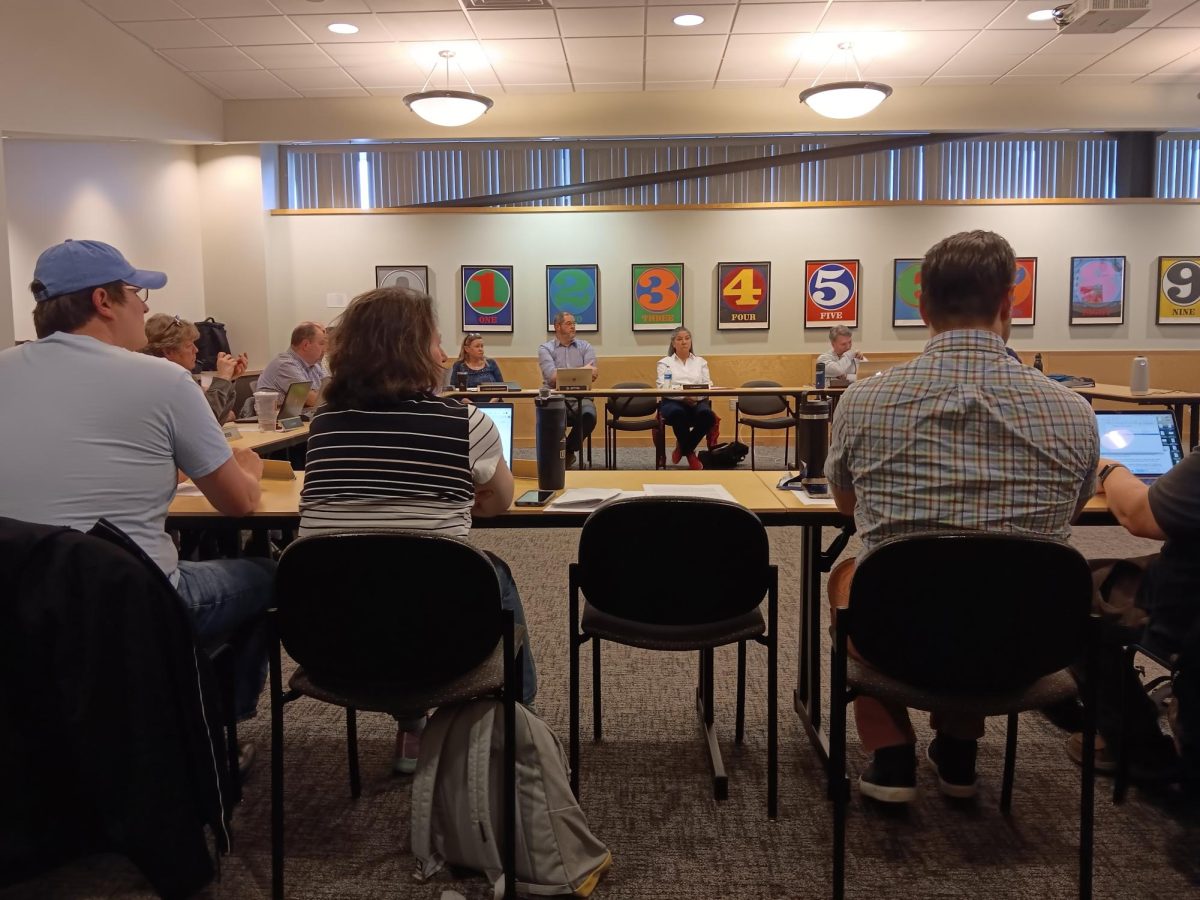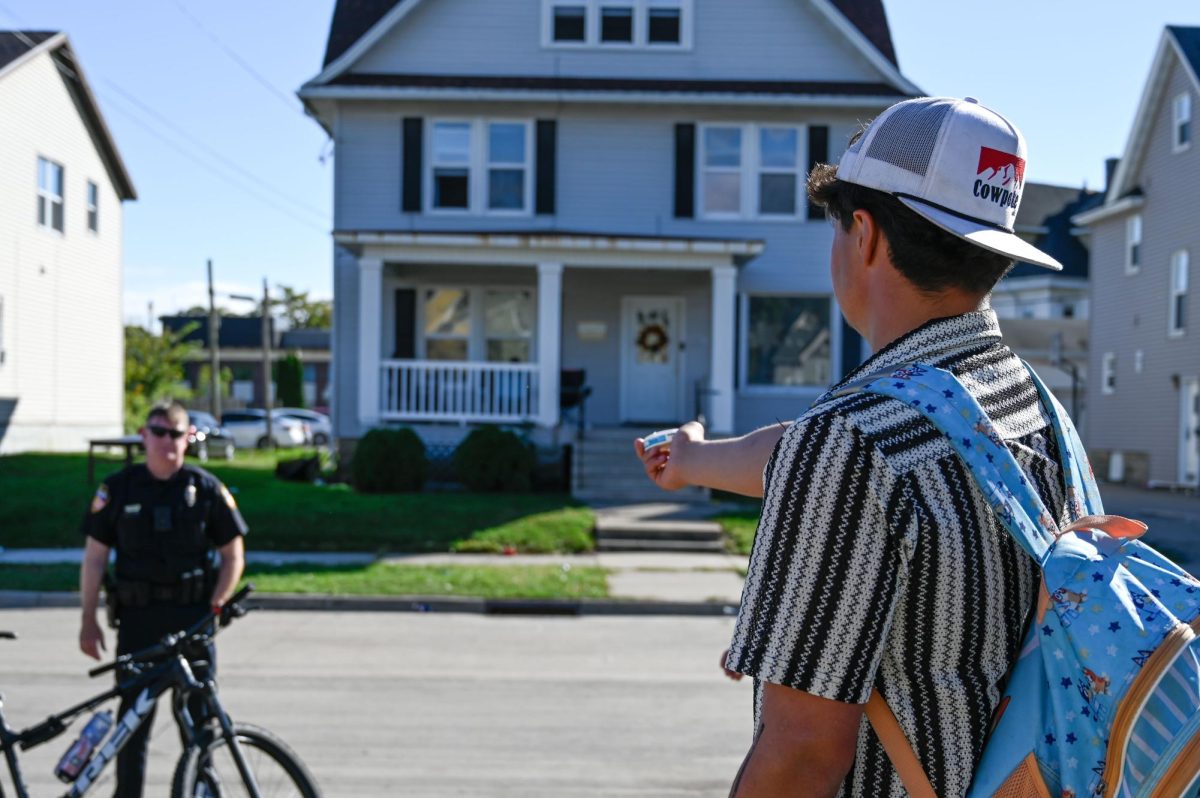The UW Oshkosh Faculty Senate voted to move forward with the petition for a vote of no confidence Tuesday afternoon, after a letter from Chancellor Andrew Leavitt asked Faculty Senate President Pascale Manning not to do so.
The Senate voted unanimously to keep the present language in place in the draft of the referendum and to continue the petition process outlined in the faculty senate constitution.
Manning said she delivered the text of the petition and referendum process to Leavitt and Chief of Staff Alex Hummel Feb. 23.
“During this meeting, the chancellor requested a copy of the petition with signatures, which I declined to share,” Manning said. “I explained that faculty have expressed concerns about retaliation and given that the president of the Faculty Senate is the only individual named in relation to such a petition in the faculty constitution, I had deemed it my responsibility to certify the validity of the signatures. I clarify now that those petitions have not been shared with anyone, including the Faculty Senate executive committee.”
The Senate will have two open meetings for faculty members to voice their opinions on the proposed referendum before a faculty vote of no confidence will take place in a separate meeting. The vote will be anonymous and online, which will enable remote faculty to participate. The Faculty Senate will not be voting as a representative body of the entire faculty. Instead, faculty senators will be voting as faculty members on drafting the referendum.
Manning received a petition from UWO faculty members on Feb. 16 asking the senate to draft a referendum of a no confidence vote for Leavitt’s leadership.
The petition was signed by 74 out of the 315 UWO faculty members, which was more than the minimum requirement of 10% of faculty signatures needed to bring the document in front of the Faculty Senate for a vote.
The document featured nine reasons why members of the faculty lack confidence in Leavitt’s ability to effectively lead UWO and want to schedule a faculty referendum regarding his job performance.
The nine points in the petition include Leavitt’s involvement in “substantial overspending of revenues” that led to the current budget deficit and staff layoffs; the failure to implement effective strategies to address enrollment declines; and a disregard for shared governance groups. Faculty and staff also mentioned that they were unhappy with Leavitt using a consulting firm, not faculty and staff, to determine layoffs.
Monday, Leavitt sent a letter to Manning that said the petition’s nine points were factually incorrect and that the Faculty Senate should “cease any further action on the proposed referendum.”
“After reviewing the petition, proposed referendum question, and the relevant Faculty Senate constitutional provisions and bylaws, I write to highlight the serious procedural flaws that underlie the referendum and, in turn, violate the Faculty Senate constitution,” Leavitt’s letter said. “I also write to remind you that the information upon which certain faculty brought this petition to you is misleading if not devoid of fact. That such an important matter as a vote of no confidence would take such a procedural path and violate the Faculty Senate constitution should give us all pause.”
Faculty Senator Stewart Cole said that there are issues with Leavitt’s claims that the petition has factual errors.
“If [Leavitt] wanted to say that he needed to support it,” Cole said. “That part of his arguments can’t carry any weight because it’s not substantiated.”
Leavitt said in his letter that everyone should be alarmed that the petition for a vote of no confidence is based on inaccurate information.
“I recognize that leadership must always be accountable,” Leavitt said in the letter. “However, I worry that improperly opening the door to a no confidence vote, let alone a referendum triggered by a petition that is based on inaccuracies, threatens UWO’s reputation and stabilizes student retention rates and enrollments.”
Faculty Senator David Siemers said that the letter from Leavitt shows how the chancellor feels about the Senate.
“He doesn’t necessarily want to hear what we have to say and we’ve [found that with] him before with the Senate in 2019,” Siemers said. “That doesn’t happen on the drop of a hat — it happens after a long set of processes, procedures and disappointments that cover an awful lot of the campus. It happens after a pattern of behavior. And it’s happened again.”
In his letter to Manning, Leavitt said that a referendum from the Faculty Senate is not “the appropriate vehicle for a vote of no confidence.”
“The Faculty Senate constitution reserves a referendum for voting on ‘policy’ only,” the letter said. “The word ‘policy’ in the first sentence [of Article 1, Section 6] modifies and constrains the term ‘such a referendum’ in the second sentence. In other words, a referendum under Article 1, Section 6, must be on a ‘policy.’ ‘Policy’ is a law, regulation, procedure or administrative action of a campus.”
Siemers said that the way he reads Article 1, Section 6 of the Faculty Senate constitution will allow the referendum to be passed.
“That, to me, creates a positive obligation for the Senate,” Siemers said. “This is not a choice of the Senate; this is responding to a bill of the faculty members to put forth that petition, and we essentially have no choice but to offer that petition language to the fact at large which is what a substantial number at this institution have said.”
Leavitt went on to say that a vote of no confidence is not a “policy” matter based on the way the word is used throughout the Faculty Senate constitution.
“The Faculty Senate constitution prevents votes on non-policy matters because, as here, it would open the door for mendacity and mischief too easily,” the letter said. “The Senate would violate its own Constitution by moving forward with this proposed no confidence referendum. As Faculty Senate president you have the authority and obligation to prevent that.”
Siemers said that the way he interprets Article 1, Section 4 of the Faculty Senate constitution, there are things the faculty can review and there are things that they cannot.
“However, we are vested with the responsibility for the immediate governance of this institution,” Siemers said. “It means that we’re invited to the table. We’re invited to comment on various things and in fact the whole thing because this is shared governance. If we can’t speak on it, then we can’t really have shared governance. So, in my view, the petition’s observations clearly meet these standards.”
In his letter, Leavitt said that it was Manning’s duty to halt the no confidence referendum.
“The plain language of the Faculty Senate constitution compels a discontinuation of the referendum process,” Leavitt said in his letter. “The misleading and patently false basis upon which certain faculty circulated the petition further compels you to halt this process so that fairness and truth may prevail.”
Cole said that the pressure Leavitt puts on Manning to shut down the no confidence vote is inappropriate.
“I was shocked by that because that’s not how the Senate operates, and he is essentially asking [Manning] to shut down the process which has been initiated by 23% of the faculty.” Cole said. “This would place [Manning] at odds with her own constituents. I think that, in particular, needs to be responded to because it didn’t strike me as an appropriate request given how democratically the Senate operates.”
A referendum of a vote of no confidence by the Faculty Senate would be largely symbolic since the UW Board of Regents is the only group with the authority to fire a Universities of Wisconsin chancellor.
The Faculty Senate plans to meet March 12 in the Reeve Memorial Union at 3:10 p.m.










